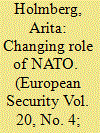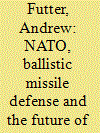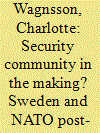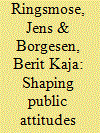|
|
|
Sort Order |
|
|
|
Items / Page
|
|
|
|
|
|
|
| Srl | Item |
| 1 |
ID:
108770


|
|
|
|
|
| Publication |
2011.
|
| Summary/Abstract |
The North Atlantic Treaty Organisation's (NATOs) changing role was debated in the face of the Strategic Concept adopted in late 2010. Two main roles can be identified in the debate; that of NATO as a defence organisation and a security organisation. The article analyses the implications of these roles for security governance and the Alliance's legitimacy - with emphasis on the novelties associated with the role of NATO as a security organisation. This development suggests an increasing need for security governance, something which is reflected in the debate. However, how for instance decision-making and implementation function in a more fragmented environment is unclear. If NATO develops its role as a security organisation new audiences are introduced that determine its appropriateness and the basis of the Alliance's input and output legitimacy changes.
|
|
|
|
|
|
|
|
|
|
|
|
|
|
|
|
| 2 |
ID:
108772


|
|
|
|
|
| Publication |
2011.
|
| Summary/Abstract |
This article comprehensively discusses the maritime dimension of the European Union's (EU's) security, which encompasses military and civilian aspects, intergovernmental and community components as well as institutional and geopolitical elements. First, the article provides a narrative of the development of the maritime element in the EU's security policy since the adoption of the European Security Strategy in 2003. By depicting the interrelations between the sea and the EU's security, the article shows that the maritime dimension of EU security is generally well established, but often obscured by the complicated institutional structure of the Union. Thereafter, the article emphasises the need to define an effective EU Maritime Security Strategy, which would provide a strategic framework for the Union's security-related activities regarding the sea that encompass maritime power projection, as well as maritime security and safety. Accordingly the article provides some recommendations concerning the definition of such a strategy and for appropriate constituting elements: the maritime-related risks and threats, the maritime strategic objectives, the means to implement the strategy, and the theatres of EU maritime operations.
|
|
|
|
|
|
|
|
|
|
|
|
|
|
|
|
| 3 |
ID:
108771


|
|
|
|
|
| Publication |
2011.
|
| Summary/Abstract |
Within the next few years, NATO will need to make a collective decision about the future of US tactical nuclear weapons (TNW) in Europe. While opinion about the value of these weapons is not as split as conventional wisdom might suggest, and while NATO will remain a nuclear alliance irrespective of this decision, balancing politics and strategy looks likely to be a difficult task. This decision is made far more complex by the determination of NATO officials to link the withdrawal of these weapons to reciprocal reductions in Russian TNW in Europe, and by the possibility of substituting the key strategic and political link they provide with a ballistic missile defense (BMD) system. This article shows how we have arrived at this position, highlights the potential benefits to NATO Europe of BMD, and considers the key questions that the Alliance will face in achieving this. Ultimately, this article shows how the future of TNW in Europe is likely to be linked to whether NATO values arms cuts with Russia, or the deployment of missile defenses, as its central priority.
|
|
|
|
|
|
|
|
|
|
|
|
|
|
|
|
| 4 |
ID:
108773


|
|
|
|
|
| Publication |
2011.
|
| Summary/Abstract |
The article asks what the evolution of NATO-Swedish relations signifies for the understanding of the evolution of security communities. Given the astonishing evolution of NATO and Sweden as a community of practise, it is logical to imagine the two as forming part of the same security community. It could then be argued that common practise can bring about new security communities rather hastily. Analysing NATO's and Sweden's recent discourses on security, the author identifies a significant gap between a principally realist and a predominantly idealist discourse that indicates that the two parties do not share key characteristics of a security community - identities, values and meanings. However, if Libya is the case of the future, the discursive differences may fade and Sweden could more easily pursue its journey towards inclusion in NATO, not as a member of an Alliance, but as a member of NATO as a security community.
|
|
|
|
|
|
|
|
|
|
|
|
|
|
|
|
| 5 |
ID:
108769


|
|
|
|
|
| Publication |
2011.
|
| Summary/Abstract |
This article seeks to explain variations in public support for the deployment of military troops to Afghanistan by means of the strategic narratives employed by national governments. Focusing on the UK, Canada, the Netherlands and Denmark, we argue that strong narratives about the why-what-and-how of overseas military missions increase the likelihood of popular support, while weak story lines are likely to result in a souring public opinion environment. Contrary to most current studies of public opinion and the support for international missions, we thus emphasise the role played by political leaders in shaping public attitudes towards the projection of military power. Surely, politicians are affected by polls and the wishes of public opinion - but popular attitudes are far from immune from political elites' attempts to rationalise the use of military force via strategic narratives.
|
|
|
|
|
|
|
|
|
|
|
|
|
|
|
|
| 6 |
ID:
108768


|
|
|
|
|
| Publication |
2011.
|
| Summary/Abstract |
In 2010, the EU agreed its third five year programme for internal security, with the Stockholm Programme building on pre-existing arrangements from Tampere and The Hague. This article seeks, firstly, to highlight the nature of the problem that has confronted the EU in the area of internal security, by exploring a range of thematic concerns regarding both the institutional and conceptual construction of the EU's internal security regime, from the lack of an effective statistical analysis into the nature of the problem confronting the member states to the continued fragmentation of the European level as a practical venue for policy-making. Having considered the consequences of these continuing structural flaws, in terms of both the EU's wider credibility and legitimacy as an actor in this key security field, the second half of the article proceeds to critically appraise the solutions contained both within the 2010 Stockholm Programme and the Treaty of Lisbon. Having considered both, it will be argued that, at best, the 'Stockholm solution' simply papers over pre-existing cracks, leaving the EU with a continued credibility gap in this important and developing area of co-operation.
|
|
|
|
|
|
|
|
|
|
|
|
|
|
|
|
|
|
|
|
|